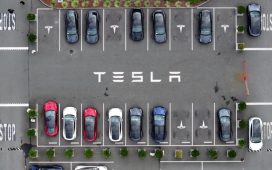Still together
The announcement was as much a repackaging of already-announced initiatives as it was a market reassurance that the three companies were still working together and focused on staying competitive. The investment figures, for example, included some $18 billion Nissan said in November it planned to spend over five years to accelerate its own vehicle electrification.
“There is not much completely new because what we wanted today is to explain you what we have in our various plans,” conceded Clotilde Delbos, Renault’s deputy CEO and CFO.
The November 2018 takedown of Ghosn threw the alliance into disarray amid plunging sales, deep losses, mutual distrust and jousting over the structure of the auto group.
Only in 2020 did the alliance return to some semblance of business as usual, under completely new leadership. At that time, the three companies carved up the world into spheres of influence, handing Renault the lead in Europe, Nissan the lead in the U.S., China, Japan and Mitsubishi the point position in Southeast Asia.
Since then, however, the alliance has been mostly quiet.
In the interim, all three carmakers have been more focused on fixing their own businesses than developing joint projects. Soon after Ghosn’s departure, each of the companies was battling falling sales and waves of red ink, as investors rushed to ditch shares in them.
Renault, Nissan and Mitsubishi each launched their own revival plans, that involved shedding workers, trimming lineups, closing plants and deep administrative cost cuts.
After notching its biggest-ever loss, Nissan expects to rebound to profitability in the current fiscal year ending March 31. Mitsubishi also forecasts being back in the black. Renault, after its own cost-cutting program that includes plans to move out of its global headquarters building, swung to a small profit in the first half of this year and aims to stay above water for all of 2021.
The latest announcement puts a forward-looking spin on the burgeoning recovery.
Multiple EV platforms
Under the new 2030 roadmap, the three companies will roll out five common EV platforms that will cover 90 percent of the 35 EV new models. The alliance already has shared EV platforms, including the CMF-EV architecture which underpins the Nissan Ariya all-electric crossover and its Renault counterpart, the Megane E-Tech. Mitsubishi and Nissan, meanwhile, have developed a shared EV platform for minicars, or Japanese “kei” cars, the so-called KEI-EV.
The CMF-EV platform will be the hero architecture through the end of the decade.
Nissan CEO Makoto Uchida said that in 2030, the alliance will be building 1.5 million vehicles a year based on that platform alone. It will underpin 15 models across five brands, including Nissan, Renault, Mitsubishi and the premium marques Infiniti and Alpine.
The CMF-EV will support nearly half of the 35 new EV models on the way.
Other shared platforms will include a CMF-AEV for affordable entries, such as the Dacia Spring, the LCV-EV for commercial vehicles such as the Nissan Town Star, and the CMF-BEV for compact EVs. Renault will take the lead in engineering this compact architecture.
Nissan said it would introduce a compact EV for Europe based on the CMF-BEV platform as a successor to its Micra. It will be made by Renault at the French company’s ElectriCity complex.
The compact EV platform will achieve a 400-kilometer (250-mile) range and enable a 33 percent reduction in cost and 10 percent reduction in power consumption, the companies said. The alliance envisions CMF-BEV supporting some 250,000 vehicles a year after its 2024 launch.
The three companies will also focus on solid-state batteries and electronics.
The companies said that by developing shared platforms and electronics, they will be able to have more than 10 million vehicles on the road across 45 alliance models equipped with autonomous driving systems by 2026. By the year, the alliance said it will also be the first global mass-market manufacturer to introduce the Google ecosystem in its cars.
The alliance is held together in a cross-shareholding relationship, with Renault owning 43.4 percent of Nissan, which in turn has a 15 percent non-voting stake Renault. Nissan has a third of Mitsubishi Motors’ stock.
A new structure has been expected by financial markets. Renault has been in the dominant position since it bailed out Nissan two decades ago but is now smaller by sales than its Japanese partner.
Reuters contributed to this report







